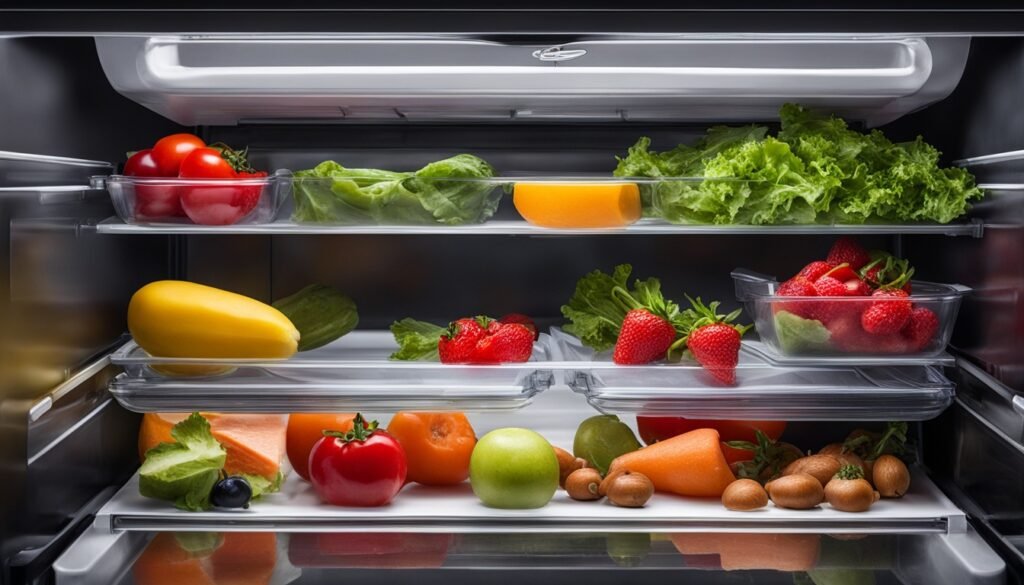Have you ever wondered why some foods seem to stay fresh and flavorful longer when they’re vacuum-sealed? It’s not just a coincidence. Vacuum sealing, or reduced oxygen packaging, offers significant food safety benefits, and here’s why.
Vacuum sealing keeps food fresh longer by removing air and sealing it. This keeps harmful bacteria, like Clostridium botulinum, away. Bacteria can make you very sick, so this is important.
But, you have to keep things clean when you’re vacuum sealing. Make sure your food is also stored right, like in the fridge or properly canned. This helps keep everything safe to eat.
Yet, vacuum sealing isn’t perfect. You still must thaw foods like fish the right way. This reduces the risk of botulism. By following safety tips, you’ll waste less food. Plus, your food will last longer without losing taste or looks.
Understanding Vacuum Sealing and Its Process
Vacuum sealing is a key way to keep food fresh by sealing out air. It helps food stay good for longer. You need to know how it works to use it well.
What is Vacuum Sealing?
Vacuum sealing makes food last longer by sucking out the air. This stops bacteria from growing, keeping food fresh. It’s a great way to store food.
How Does Vacuum Sealing Work?
First, food goes into a special airtight bag. Then, a vacuum sealer takes out all the air. This leaves a space almost without oxygen. Lastly, the bag seals tight to keep air out and food fresh.
Types of Foods Suitable for Vacuum Sealing
Vacuum sealing is good for many foods, like:
- Bulk meats such as beef, poultry, and lamb
- Dairy products like cheese and butter
- Vegetables, especially those frozen for storage
- Non-perishable items such as coffee beans and nuts
But, not every food is okay for vacuum sealing. Don’t seal raw onions, fresh mushrooms, or raw garlic. They might have harmful bacteria. Also, be careful how you seal bakery foods and liquids.
Improving Food Safety Through Vacuum Sealing
Vacuum sealing boosts food safety and quality by a lot. It helps stop bacteria from growing and keeps food fresh. It also stops things like freezer burn and drying out.
Inhibiting Bacterial Growth
When you vacuum seal, there’s hardly any air left. This is key in stopping bacteria, especially types that need air to live. Less bacteria means less chance of getting sick from food.
Preventing Freezer Burn and Dehydration
Vacuum sealing is great at avoiding freezer burn. Freezer burn makes food dry and tough by pulling out the moisture. With vacuum sealing, your food stays moist and fresh.
Maintaining Freshness and Quality
Vacuum sealing keeps food tasting and looking great. It’s super for keeping fruits, veggies, and meats good for much longer. This helps cut down on food waste, which, by the way, is a huge problem globally.
Below is a table that shows types of vacuum sealers and why they are good:
| Type of Vacuum Sealer | Main Benefits |
|---|---|
| Single-use Plastic Bags | Convenient, effective for air-tight sealing, widely available |
| Reusable Vacuum Boxes | Sustainable, cost-effective in the long run, environmentally friendly |
Together, good food handling and vacuum sealing make a big difference. It protects food from air, bacteria, and keeps it fresh. This not only saves food but also keeps us eating healthier, fresh food.
Extending Shelf Life with Vacuum Sealing
Vacuum sealing is great for making food last longer. It keeps food fresh. And it helps keep the nutrients in food too.
Comparison with Other Storage Methods
Vacuum sealing is way better than using plastic wrap or foil. It keeps the air out. This makes food last a lot longer. For example, meat can last up to 2-3 years when vacuum sealed. Without it, meat may only last 4-12 months. This shows how vacuum sealing is a cool way to keep food fresh and reduce waste.

| Food Item | Normal Shelf Life | Vacuum Sealed Shelf Life |
|---|---|---|
| Meat | 4-12 months | 2-3 years |
| Luncheon Meat | 1-2 months | 6 months |
| Ground Meat | 3-4 months | 1 year |
| Green Beans | 8 months | 2-3 years |
| Berries | 6-8 months | 2-3 years |
| Cooked Chicken | 3-4 days | 2 weeks |
| Citrus Fruits | 3-4 weeks | 1 month |
| Hardboiled Eggs | 1 week | 1 week |
| Brown Rice | 6 months | 10 years |
| Ground Coffee | 6 months | 2 years |
| Rice (white) Pasta | 1-2 years | 2-3 years |
Impact on Nutrient Retention
Vacuum sealing also keeps food’s nutrients longer. It slows nutrient loss. For instance, green beans can keep their nutrients for 2-3 years, much longer than usual. This method makes food healthier and last longer. Berries keep their nutrients for 2-3 years too. This makes vacuum sealing a top way to store food.
For more details on extending shelf life with vacuum sealing, read the guides. They will teach you how to store food well. Keeping your food fresh and healthy for longer.
Food Safety Benefits of Vacuum Sealing
One big advantage of vacuum sealing is cutting down on food waste. It helps food last longer. This means less food is thrown out early because it’s gone bad.
Reducing Food Waste
Less food waste is good for the planet and your wallet. Vacuum sealing takes out the air in the package. This slows down how fast the food gets old, keeping it fresh and good to eat for longer.
Air-tight Packaging: Benefits and Considerations
Air-tight packaging is key for vacuum sealing. It keeps the food’s quality up. An air-tight seal stops smells from one food going to another. It also lets you use your storage space better.
Conclusion
Vacuum sealing is great for keeping food safe and fresh. It removes air, which stops bacteria and mold from growing. This makes food last longer. In the USA, 97% of beef is sealed this way when it’s being stored for sale. This shows how important it is for meat. Meat can stay good for 12 to 14 weeks when it’s sealed and kept very cold, without losing quality.
Sealed meat also saves on people’s work and cuts down on waste in stores. But, some meats won’t look good when they are sealed without air. They might look purple. Yet, pork chops look better and keep a good color when sealed this way compared to storing them where they touch air.
Vacuum sealing is just one way to keep food safe. There are other ways, like using special bags or trays. It’s important to choose the right way for what you’re storing. Doing it right can keep food fresh, prevent waste, and make your food safer to eat. So, using good sealing methods is a smart choice for your home or business.
FAQ
What is Vacuum Sealing?
Vacuum sealing is how we keep food fresh longer. We take the oxygen out of the package. Then, we seal it. This stops harmful bacteria and mold from growing on the food.
How Does Vacuum Sealing Work?
It works by sucking the air out. Food goes in a special bag. Then, a machine takes the air out. We seal the bag. Now, the food is safe from air.
What Types of Foods are Suitable for Vacuum Sealing?
Lots of foods can be vacuum sealed. This includes meats, veggies, dairy, and more. Coffee beans are good too. But stay away from sealing things like raw onions and mushrooms. These can be harmful because of a bacteria called botulinum.
How Does Vacuum Sealing Inhibit Bacterial Growth?
It stops bacteria by taking the air away. Bacteria need air to grow. Without it, they can’t thrive. This keeps dangerous bacteria like pathogens in check.
How Does Vacuum Sealing Prevent Freezer Burn and Dehydration?
It blocks out air and moisture. This stops freezer burn and dehydration. Your food stays colder and fresher. No more dried-out meats or ice crystals on vegetables.
How Does Vacuum Sealing Help Maintain Freshness and Quality?
It keeps food tasting great for longer. By removing air, it saves the food’s flavor and color. Your meal stays as fresh as when you first made it.
How Does Vacuum Sealing Compare to Other Storage Methods?
It’s better than using plastic wrap or foil. Foods last 3 to 5 times longer. This is because there’s not much air in the package.
What is the Impact of Vacuum Sealing on Nutrient Retention?
Vacuum sealing keeps food healthy. It saves the vitamins and minerals. Food does not lose its nutrients as quickly. So, it’s a better way to store food.
How Does Vacuum Sealing Reduce Food Waste?
Vacuum sealing makes food last much longer. This means less food is thrown away. It’s a great way to cut down on waste.
What are the Benefits and Considerations of Air-Tight Packaging?
Air-tight packages stop smells and save space. Also, they make food last longer. But, always handle food safely when sealing it. This avoids any risks.
